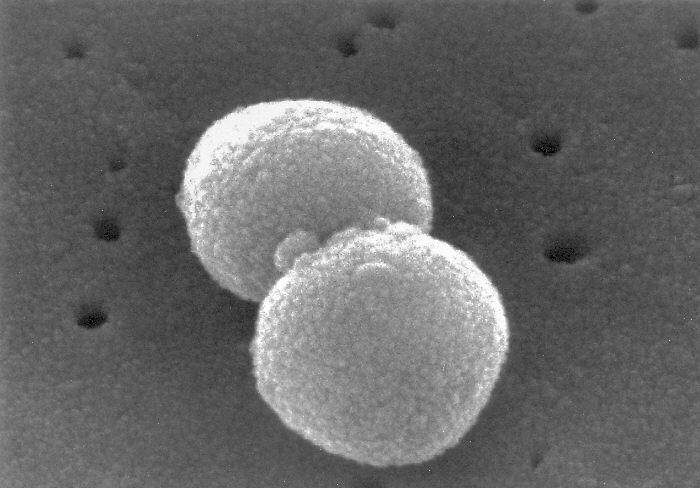Findings suggest that probiotics could be an alternative to antibiotics for treating pneumonia and other respiratory illnesses

Credit: Janice Haney Carr, Centers for Disease Control and Prevention’s Public Health Image Library (CC0 1.0)
New insight on how bacteria in the lungs protect against invading pathogens has been published today in the open-access eLife journal.
The study in mice shows that a strain of lung bacteria called Lactobacillus provides a barrier against Streptococcus pneumoniae (S. pneumoniae) colonisation in animals previously infected with influenza A virus when applied therapeutically following infection. S. pneumoniae can cause severe pneumonia especially in elderly patients. In light of increasing antibiotic resistance, these findings suggest that probiotics may offer an alternative treatment approach for bacterial lung infections.
In healthy organisms, ‘commensal’ bacteria, which live inside the host without harming it, provide a competitive barrier against invading bacterial pathogens. “It is already well known how commensal bacteria in the gut fight off pathogens,” explains co-first author Soner Yildiz, Postdoctoral Research Fellow at the University of Geneva, Switzerland. “But how lung bacteria such as Lactobacillus carry out this role is less clear.”
To address this gap, Yildiz and colleagues studied the role of lung microbiota against Pneumococcus colonisation in mice. The team had previously reported that a significant amount of Lactobacillus bacteria, which are known to act as antimicrobials and immune system modulators, exist in the lung microbiota of healthy mice. In the current study, they identified these commensal bacteria as Lactobacillus murinus (L. murinus), with further gene sequencing and microscopy showing that the bacteria are tightly associated with mouse lung tissue.
The team next exposed cultures of L. murinus to S. pneumoniae. They found that L. murinus inhibited the growth of the pathogen through the release of lactic acid. “This antibacterial activity was not limited to S. pneumoniae,” says co-first author João Pereira Bonifacio Lopes, PhD student at the University of Geneva. “It also affected S. aureaus, the pathogen that can cause bloodstream, bone and joint infections, as well as pneumonia.”
Finally, they treated mice with L. murinus following influenza A infection and found that the bacteria provided a barrier against pneumococcal colonisation in the animals.
“This suggests that resident commensals in the lung could be applied as probiotics to counteract lung colonisation by pathogenic bacteria,” concludes senior author Mirco Schmolke, Group Leader at the University of Geneva. “However, further studies are needed before this can be explored as a potential treatment in humans. If it one day proves to be effective, the approach could improve the clinical outcomes for patients who are susceptible to respiratory tract infections.”
###
Reference
The paper ‘Respiratory tissue-associated commensal bacteria offer therapeutic potential against pneumococcal colonization’ can be freely accessed online at https:/
Media contact
Emily Packer, Media Relations Manager
eLife
[email protected]
+44 1223 855373
About eLife
eLife is a non-profit organisation created by funders and led by researchers. Our mission is to accelerate discovery by operating a platform for research communication that encourages and recognises the most responsible behaviours. We work across three major areas: publishing, technology and research culture. We aim to publish work of the highest standards and importance in all areas of biology and medicine, including Microbiology and Infectious Disease, while exploring creative new ways to improve how research is assessed and published. We also invest in open-source technology innovation to modernise the infrastructure for science publishing and improve online tools for sharing, using and interacting with new results. eLife receives financial support and strategic guidance from the Howard Hughes Medical Institute, the Knut and Alice Wallenberg Foundation, the Max Planck Society and Wellcome. Learn more at https:/
To read the latest Microbiology and Infectious Disease research published in eLife, visit https:/
Media Contact
Emily Packer
[email protected]
Original Source
https:/
Related Journal Article
http://dx.
https://scienmag.com/scientists-shed-new-light-on-how-lung-bacteria-defend-against-pneumonia/




